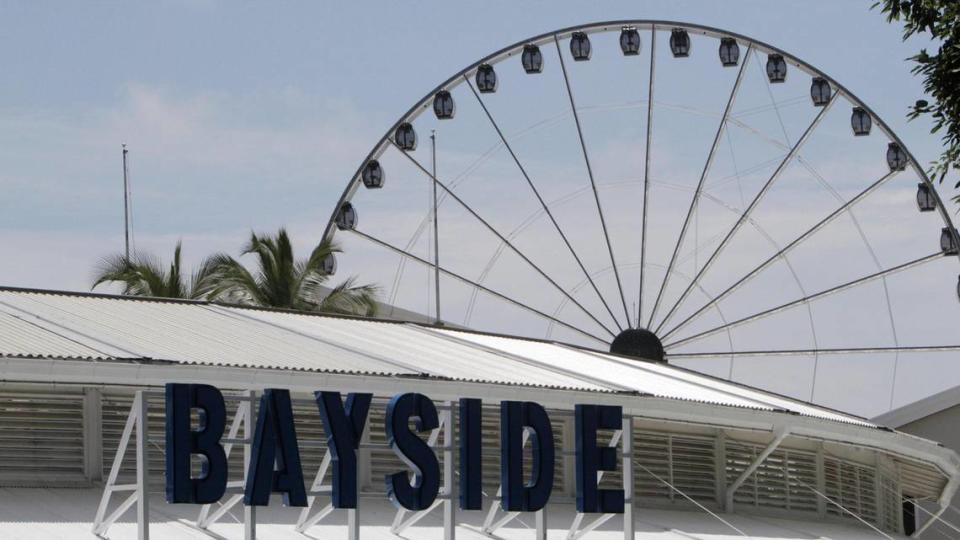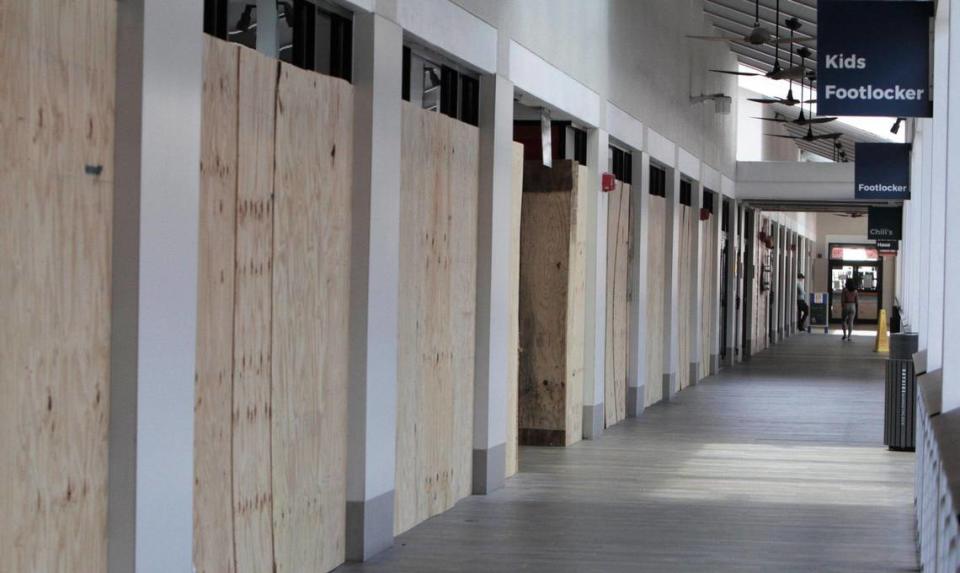Shaken by protests, Bayside Marketplace tries to keep rolling
On a recent Wednesday, just after noon, a smattering of tourists drifted through Bayside Marketplace, the venerable outdoor shopping and dining complex perched against the eastern rim of Biscayne Bay.
One was Cheryl Hosey of Atlanta. She was with family members, shopping for jewelry at the complex.
“My sister bought from here before and liked it,” she said. “So we’re back.”
Other visitors hailed from Pittsburgh and Tennessee. None was from outside the U.S. — a sign that life has not quite returned to normal at Bayside.
But on this afternoon, Pam Weller, vice president of asset management at the breezy shopping and dining complex, was projecting an air of tranquility about the marketplace’s future. And why not, when there is so much to look forward to, she says: At least two new bar and restaurant concepts are set to open later this year; a Ferris wheel-style observation wheel is coming, and despite delays, a new super-tall entertainment venue, SkyRise Miami, remains on the books.
“We were on a roll, doing great,” she said.
Before the COVID outbreak, Bayside was in the midst of a critical transformation, trying to shed its tourist-trap reputation to become a venue geared toward attracting locals who may not have visited the marketplace since they were kids. Where shops once focused on tourist tchotchkes, now many sell familiar brands like Bath & Body Works, U.S. Polo and Victoria’s Secret. A microbrewery was to be adjacent to the Hooters restaurant.
Yet as with almost all businesses, the coronavirus pandemic has taken a toll. Many of the carts and kiosks that dot the plaza’s walkway remain shuttered.
Bayside has been a meeting point for many of the recent protests spurred by the death of George Floyd. It was the target of looting amid one of the rare violent demonstrations, when at least five stores, including Footlocker and Guess, saw property damage. Some storefronts remain boarded up. This past week, the nearby Christopher Columbus statue was defaced.
While the physical damage was relatively confined, some store owners say the shopping district’s reputation has taken a more serious hit.
“Local traffic is not coming because the restaurants are still closed,” said Jonathan Neuwirth, a longtime tenant and owner of Bayside Logo Shop. “There is no ambiance — the atmosphere of shopping is not there because it’s all plywood. It’s a terrible feeling when you see everything.”
Miami Mayor Francis Suarez and the Greater Miami Chamber of Commerce attempted to offer a boost in late May, holding a press conference at the marketplace’s entrance to declare Bayside open for business.
One key development: Weller announced that Bayside businesses had received a total of about 50 Paycheck Protection Program loans. And July is often Bayside’s best month, said Weller, thanks to July 4 festivities held there that lure crowds.
Weller insists the marketplace’s best days are ahead.
“I think people will come back, because it’s kind of our history,” she said. “It’s like where we come from. Everyone has a story about Bayside — their first date with their husband, our daughter’s quince. So everybody has a story about Bayside, and I think they’ll all come back.”

‘Desolate area’
The plan for Bayside Marketplace was finalized in 1985, and it opened two years later as part of a larger vision for sprucing up the downtown bayfront, according to Xavier Suarez. Suarez was mayor of Miami when Bayside opened; he is now a Miami-Dade commissioner, while his son Francis is city mayor.
“We had basically a parking lot, and a driveway that got you to a mini-convention center, a fieldhouse, no more than 100,000 square feet,” Suarez said. “It was kind of a desolate area.”
The goal was to use 10% of the area as commercial space, keeping the rest as green space. It was thought that eventually, Bayfront would be among the most heavily visited parks in the world.
Another key element: Half of the businesses at the marketplace were to be minority owned — 25% black, 25% Latino. The McDuffie riots of 1979 were fresh in local memory as the project was being developed, and civic-minded leaders hoped to address inequities through this measure.
“To their credit, [the developers] kept their promise to do that,” Suarez said.
Concurrently, the Bayside Foundation was set up to provide loans to minority entrepreneurs throughout Miami-Dade. In 2018, the most recent year for which data is available, the foundation made about $400,000 in educational grants and $245,000 in 487 scholarships as well as $3.5 million in loans to minority businesses in Miami helping create more than 400 jobs.
As time went by, the original vision for the park dimmed.
“It was a beautiful park, just not kept as well as it should have,” Suarez said. “Bayside Marketplace was supposed to complement it.”
Added Paul George, resident historian at the HistoryMiami Museum, “The opening was spectacular...but it trailed off.”
Even as the marketplace fell off locals’ radars, it proved a draw for tourists as Miami’s international profile grew. When the global cruising industry began to boom in the city, Bayside became a must-see for visitors.
“Very rarely does a cruiser come into town and not stay in Miami the night before to catch the cruise,” Weller said. “So then we became the place to go before and after the cruise.”
New tenants
Today, Bayside Marketplace is owned by New York-based Ashkenazy Acquisition Corp., which also controls Union Station in Washington, D.C.; Faneuil Hall in Boston; and the Plaza Hotel in New York. Ashkenazy reportedly paid nearly $200 million for its stake in Bayside in 2015. Ashkenazy did not respond to a request for comment about the future of the marketplace, and Weller declined to disclose Bayside’s current revenues.
Bayside currently pays $1.5 million in rent to hold its ground lease with the city of Miami, which runs through 2067. Meanwhile, the Bayside Foundation has largely divorced itself from the marketplace. Kathleen Quinn, foundation director, said the foundation’s endowment is now less than 50% tied to the marketplace, although it still receives a fixed grant from it each year. But because the amount is preset, there is no way to track Bayside’s performance. Quinn says the foundation remains in financially sound condition and will be largely unaffected by a downturn in the marketplace’s finances.
Before the pandemic, Bayside was in the midst of a $27 million renovation to help its image stay current.
Storefronts were modernized to reflect a more contemporary feel under the guidance of Miami design firm Zyscovich Architects, to bring Bayside “up to a certain design level,” as Weller put it. It’s the first major renovation in recent memory: New color schemes, new wood-grain floor panels, and new lighting and finishes have all been designed to help the mall compete for local market share.
Meanwhile, Bayside has sought to upgrade its tenant class. What was once designed as a casual island market has gone uptown with retailers including Disney, Crocs, Starbucks, Express, Harley-Davidson and Original Penguin.
“The biggest change is how we’re adding national tenants,” Weller said. “Before you could come and see merchandise here that was not necessarily at a regional mall. But the really cool thing now is we’re sprinkling in brands like Landshark, like Margaritaville, bringing in those national [brands] to draw more people in.”

Double crisis
The upgrades were starting to pay off. “We probably had our best year ever before the pandemic,” Weller said. “And just really on an aggressive roll with tourism and gaining residential [customers] back.”
But as the virus set in, traffic began to tail off; in mid-March, the county and state officials shut down all nonessential businesses. Weller said five restaurants stayed open doing takeout and pickup for local residents and first responders. “That was really special because people liked having some place to go,” she said.
Then, the last week of May, the protests came.
“We went through quite a weekend,” said Mike Simpson, president of Island Queen Cafe, Cruises & Tours Inc., a family-owned business that has been with Bayside since its inception. “It was little bit of de-motivator.”
Through a relationship from Ashkenazy, Bayside tenants were able to tap into a total of 50 PPP loans, thanks to relationships with New Jersey-based Valley Bank and Coral Gables-based International Finance Bank.
But despite the loans, some businesses at Bayside — as elsewhere across the country — have laid off and furloughed workers as they contend with local safety restrictions.
Simpson says he has been forced to furlough about 75% of his employees, which number more than 200. He says he continues to go back and forth with the city of Miami as to how he can fully reopen his boating operations.
Simpson is accustomed to figuring things out. This time has been different. “There’s no manual for this,” he said.
Mostly, he just wants the restrictions to end.
“Let’s not do any more damage,” Simpson said. “Let’s follow the guidelines, but not go backwards. Let’s contribute to rebuilding. Every day we are closed we lose momentum.”
Weller said restaurants are still doing only about 25% of business before the crises hit.
Weller remains optimistic.
Landshark, a bar and grill from Jimmy Buffett’s Margaritaville franchise named after the beer, is still scheduled to open June 30 underneath Hard Rock Cafe. Mason’s Lobster, a new seafood restaurant, is slated to debut the day after.
Coming by July 4, Weller says, is SkyViews Miami, a 176-foot-tall observation wheel south of Hard Rock Cafe that originally should have opened in time for the Super Bowl in February. Unlike a Ferris wheel, which has open gondolas that typically hold two to eight seated passengers, an observation wheel has enclosed capsules that hold up to 20 people, who can walk around in the capsule. An observation wheel usually rotates slower than a Ferris wheel.
“We believe people just want to get out, and also be in an outdoor environment versus an indoor shopping center. That’s our niche today, being on the water, outside with varieties of tenants open.”
Others, like Neuwirth, the longtime tenant, have a gloomier outlook.
“There’s no way to describe how terrible things are right now,” he said.
Neuwirth says the public still doesn’t feel safe coming to downtown amid the ongoing protests — and even if visitors came, they’d find some stores still boarded up.
Henry Leace, another longtime tenant who owns Havana Nines clothing store and Mojitobar eatery, agrees that the mall’s image has taken a hit from the protests.
“The impact it’s having on the center has been devastating,” Leace said. “Even more so than the pandemic.”
Still out of reach is SkyRise Miami, a 990-foot-tall entertainment and observation tower — billed as a “vertical entertainment center” and the future “signature landmark” of Miami. Led by Berkowitz Development in partnership with Legends Development, Weller says the developers “are in possession and have made several improvements to the area.” For now, there’s a descriptive website — skyrisemiami.com. Berkowitz did not respond to a request for comment.
Anyone who thinks Bayside is in Miami’s rearview mirror needs a rethink, Weller says. “We’ve got a lot of neat things happening, that have been planned for way longer than the pandemic, and it didn’t stop, so we’re continuing to work through our plan.”
Miami Herald staff writer Carli Teproff contributed to this report.

